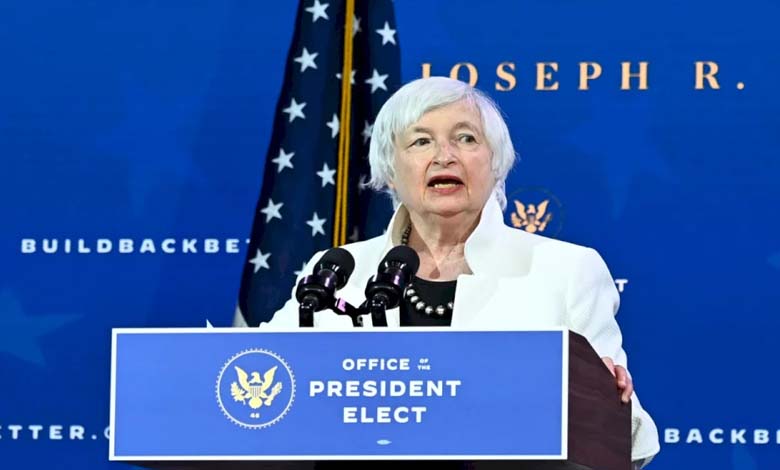Washington warns of a possible cut in relations between Israeli and Palestinian banks
The U.S. Treasury Secretary informed the Jordanian King that any Israeli move to cut financial ties with Palestinian banks would increase the risk of regional instability.

Wally Adeyemo, the U.S. Deputy Treasury Secretary, urged Israel to extend its banking relations with Palestinian banks for at least one year to avoid an economic crisis in the West Bank, warning that Israel’s own security was at stake.
-
Verbal confrontation between Ben-Gvir and Military leaders reveals the scale of Israeli division
-
Analyst: Displacement of the Palestinian People is a Key Goal of the Israeli Occupation
Adeyemo conveyed this message during a meeting with the Governor of the Bank of Israel, Amir Yaron, in New York on Monday, on the sidelines of the UN General Assembly meetings, before meeting separately with Jordan’s King Abdullah.
In a statement, the Treasury Department said that during his meeting with Yaron, Adeyemo expressed U.S. government concerns about threats made by some in the Israeli government to cut banking relations between Israeli and Palestinian banks, insisting on the need to extend these relations for at least one year.
-
Netanyahu between Street Anger and the Grip of the Right… Limits of Tolerance “at Risk”
-
Hezbollah Focuses on Targeting Israeli Gas Fields
The Israeli mission to the UN declined to comment.
U.S. officials have been warning for months that threats made by Israeli Finance Minister Bezalel Smotrich and other Israeli officials to prevent Palestinian banks from connecting with their Israeli counterparts could destabilize the Palestinian Authority, which in turn could harm Israel’s security.
The Treasury Department noted that the banking correspondences between Israel and Palestine are set to expire on October 31, posing risks to export and import transactions valued at around $10 billion.
-
Agreement between Hamas and Fatah to form a temporary national reconciliation government
-
Know Hezbollah’s “Primitive” Tactics in Confronting Israeli Technology
A source familiar with the discussions said Adeyemo told King Abdullah that any Israeli move to cut ties with Palestinian banks would increase the risk of regional instability and could lead to covert Palestinian financial transactions, which could harm Israeli and regional security.
U.S. Treasury Secretary Janet Yellen had raised similar concerns ahead of a G7 finance ministers’ meeting in May, and the issue was mentioned in two joint G7 statements.
-
“Loophole” in Gaza ceasefire negotiations… Hamas condition clashes with Israeli wall
-
The Israeli Dilemma… Who Governs Gaza After the War?
An unnamed U.S. official said, “The ability of the Palestinian Authority to survive is crucial for stability in the West Bank, which is in turn critical for Israel’s national security.”
On Monday, the World Bank warned that the Palestinian territories are already nearing an “economic free fall,” with Gaza’s GDP projected to drop by 86% year-on-year in the first quarter of 2024, and the Palestinian Authority facing a $1.86 billion funding gap for 2024, with an increasing risk of “systemic failure.”
-
Violent Clashes Between Hezbollah and Israel Amid Preparations for Total War in Southern Lebanon
-
Dangerous Escalation: Hezbollah Targets Israeli Fighter Jets for the First Time Since the War Began
In June, Smotrich extended an exemption allowing Israeli banks to cooperate with Palestinian banks in the West Bank, but only for four months, unlike his predecessors who extended it for a full year.
The exemption allows Israeli banks to process payments in shekels for services and salaries linked to the Palestinian Authority, without the risk of being accused of money laundering or financing terrorism. Without this exemption, Palestinian banks would be disconnected from the Israeli financial system.
-
Stubbornness from Hamas and Israeli conditions are dimming hopes for a ceasefire
-
Washington Tests Military Capabilities Amid Escalation Between Israel and Iran
Analysts believe that Smotrich’s threats are not serious, given the significant economic damage Israel would face from cutting banking ties with Palestine, and that the U.S. administration and the international community would not accept such a move without providing alternatives for the Palestinians, such as allowing them to import goods from abroad.
However, Palestinians understand that the aim behind this Israeli measure is to cause them significant harm, rather than offering better alternatives, which leads them to take Smotrich’s threats seriously.
-
Israel Caught Between Rafah and Iran.. Will it Break the Pressure Barrier?
-
Israeli Army and Mossad Agree on Plans to Strike Iran
Israel imposes high prices on essential goods, particularly fuel, where prices in Palestine are the highest in the region, exceeding two dollars per liter of gasoline, for example.
Palestinians in the West Bank and Gaza Strip import goods and services from Israel worth $8 billion annually and export $1.7 billion to Israel, according to official government statistics.
-
Israel Sets Date to End “Gaza Incursion” and Outlines Next Phase
-
“The most horrible and cruel”… Palestinians experiencing the Nakba mourn their present
Palestinian imports from Israel include essential goods and services, such as fuel and electricity, while fuel is one of the goods that is tightly restricted from being imported from abroad.
Political and economic agreements signed between Israel and the Palestinian Authority restrict Palestinian import and export operations, as well as value-added tax.












